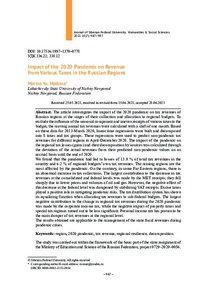Показать сокращенную информацию
Impact of the 2020 Pandemic on Revenue from Various Taxes in the Russian Regions
| Автор | Malkina, Marina Yu. | en |
| Автор | Малкина, М. Ю. | ru_RU |
| Дата внесения | 2021-07-28T02:22:20Z | |
| Дата, когда ресурс стал доступен | 2021-07-28T02:22:20Z | |
| Дата публикации | 2021-07 | |
| URI (для ссылок/цитирований) | https://elib.sfu-kras.ru/handle/2311/142129 | |
| Аннотация | The article investigates the impact of the 2020 pandemic on tax revenues of Russian regions at the stages of their collection and allocation to regional budgets. To exclude the influence of the seasonal component and uneven receipts of various taxes to the budget, the moving annual tax revenues were calculated with a shift of one month. Based on these data for 2013-March 2020, linear time regressions were built and decomposed into 8 taxes and tax groups. These regressions were used to predict non-pandemic tax revenues for different regions in April-December 2020. The impact of the pandemic on the regional tax losses (gains) and their decomposition by sources was calculated through the deviation of the actual revenues from their predicted non-pandemic values on an accrual basis until the end of 2020. We found that the pandemic had led to losses of 13.9 % of total tax revenues in the country and 6.2 % of regional budgets’ own tax revenues. The mining regions are the most affected by the pandemic. On the contrary, in some Far Eastern regions, there is an abnormal increase in tax collections. The largest contribution to the decrease in tax revenues at the consolidated and federal levels was made by the MET receipts; they fell sharply due to lower prices and volumes of oil and gas. However, the negative effect of this decrease at the federal level was dampened by stabilizing VAT receipts. Excise taxes played a positive role in mitigating pandemic risks. The tax distribution system has shown its equalizing function when allocating tax revenues to sub-federal budgets. The largest negative contribution to the change in regional tax revenues during the 2020 pandemic was made by the corporate income tax, while the negative impact of property taxes and special tax regimes turned out to be less significant. Personal income tax has proven to be the main damper of tax revenues at the regional level. The results obtained are applicable to the management of the state fiscal revenues during pandemic crises | en |
| Аннотация | В статье исследуется влияние пандемии 2020 года на налоговые доходы российских регионов на этапе их сбора и распределения в региональные бюджеты. Для исключения влияния сезонной составляющей и неравномерности перечисления отдельных налогов в бюджет мы рассчитываем скользящие годовые значения налоговых доходов со сдвигом в 1 месяц. На основе этих данных за 2013- март 2020 года построены линейные временные регрессии, а также проведена их декомпозиция по 8 налогам и налоговым группам. Эти регрессии положены в основу прогнозирования непандемических налоговых доходов регионов в апреле-декабре 2020 года. Влияние пандемии на налоговые потери (выигрыши) регионов и их декомпозиция по источникам осуществлялись на основе расчета отклонений фактических доходов от прогнозных непандемических значений нарастающим итогом до конца 2020 года. Выявлено, что пандемия привела к потерям 13.9 % общих налоговых доходов в стране и 6.2 % налоговых доходов территориальных бюджетов. Наиболее пострадавшими от пандемии оказались добывающие регионы. Между тем в некоторых дальневосточных регионах отмечался аномальный рост налоговых сборов. Наибольший вклад в снижение налоговых доходов консолидированного и федерального бюджета внес НДПИ, поступления по которому резко упали из-за снижения нефтегазовых доходов. Однако его негативный эффект на федеральном уровне демпфировался стабилизирующимися поступлениями по НДС. Некоторую положительную роль в смягчении пандемических рисков сыграли акцизы. При формировании доходов субфедеральных бюджетов проявилась выравнивающая функция системы распределения налогов. Наибольший отрицательный вклад в изменение налоговых поступлений в региональные бюджеты в условиях пандемии 2020 внес налог на прибыль, менее существенным оказалось отрицательное влияние налогов на имущество и поступлений от налоговых спецрежимов. Основным демпфером налоговых поступлений на региональном уровне стал НДФЛ. Полученные результаты могут быть полезными для управления фискальными доходами государства в условиях пандемических кризисов | ru_RU |
| Язык | en | en |
| Издатель | Сибирский федеральный университет. Siberian Federal University | en |
| Тема | region | en |
| Тема | 2020 pandemic | en |
| Тема | tax revenue | en |
| Тема | regional resilience | en |
| Тема | decomposition | en |
| Тема | регион | ru_RU |
| Тема | пандемия 2020 года | ru_RU |
| Тема | налоговые доходы | ru_RU |
| Тема | устойчивость регионов | ru_RU |
| Тема | декомпозиция | ru_RU |
| Название | Impact of the 2020 Pandemic on Revenue from Various Taxes in the Russian Regions | en |
| Альтернативное название | Влияние пандемии 2020 года на доходы российских регионов от разных налогов | ru_RU |
| Тип | Journal Article | en |
| Контакты автора | Malkina, Marina Yu.: Lobachevsky State University of Nizhny Novgorod Nizhny Novgorod, Russian Federation; mmuri@yandex.ru; ORCID: 0000-0002-3152-3934 | en |
| Контакты автора | Малкина, М. Ю.: Нижегородский государственный университет им. Н. И. Лобачевского Российская Федерация, Нижний Новгород | ru_RU |
| Страницы | 987–997 | ru_RU |
| DOI | 10.17516/1997-1370-0778 | |
| Журнал | Журнал Сибирского федерального университета. Гуманитарные науки. Journal of Siberian Federal University. Humanities & Social Sciences; 2021 14 (7) | en |

